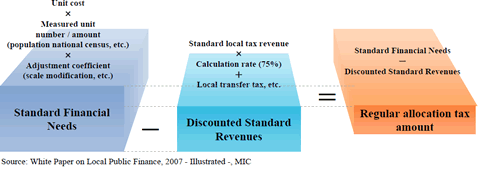- TOP>
- Local Public Finance System in Japan>
- How local tax allocations works
How local tax allocations works
Local allocation tax (LAT) is set at a given percentage of the five major national taxes-income, corporate profits, alcohol,
consumption, and tobacco. The allocations are distributed to correct inequalities among public bodies in Japan's regions and to ensure that citizens receive a consistent standard of public services regardless of area of residence.
Basics: Total amount is legally linked directory to the amount of five national taxes (32% of income tax and liquor tax, 34% of corporate tax, 29.5% of consumption tax, 27.5% of tobacco tax). If that is not enough to make up for all imbalances, national government needs to increase the amount or take other measures under the law.
Calculation Formula
- • 94% of the LAT is distributed to each local government as the following mechanism:
[Standard Financial Needs(SFN)] - [Discounted Standard Revenues(DSR)] - • SFN is calculated to ensure the basic financial needs including some debt payment as diagram below indicates;
- • DSR accounts for 75% of estimated standard tax revenues to give incentive to collect taxes as diagram below indicates;





